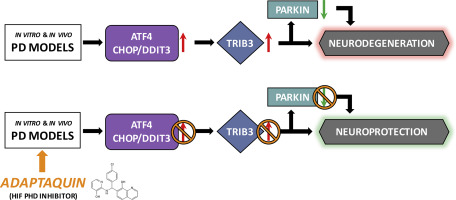当前位置:
X-MOL 学术
›
Neurobiol. Dis.
›
论文详情
Our official English website, www.x-mol.net, welcomes your feedback! (Note: you will need to create a separate account there.)
The drug adaptaquin blocks ATF4/CHOP-dependent pro-death Trib3 induction and protects in cellular and mouse models of Parkinson's disease.
Neurobiology of Disease ( IF 6.1 ) Pub Date : 2020-01-03 , DOI: 10.1016/j.nbd.2019.104725 Pascaline Aimé 1 , Saravanan S Karuppagounder 2 , Apeksha Rao 3 , Yingxin Chen 2 , Robert E Burke 4 , Rajiv R Ratan 2 , Lloyd A Greene 1
Neurobiology of Disease ( IF 6.1 ) Pub Date : 2020-01-03 , DOI: 10.1016/j.nbd.2019.104725 Pascaline Aimé 1 , Saravanan S Karuppagounder 2 , Apeksha Rao 3 , Yingxin Chen 2 , Robert E Burke 4 , Rajiv R Ratan 2 , Lloyd A Greene 1
Affiliation

|
Identifying disease-causing pathways and drugs that target them in Parkinson's disease (PD) has remained challenging. We uncovered a PD-relevant pathway in which the stress-regulated heterodimeric transcription complex CHOP/ATF4 induces the neuron prodeath protein Trib3 that in turn depletes the neuronal survival protein Parkin. Here we sought to determine whether the drug adaptaquin, which inhibits ATF4-dependent transcription, could suppress Trib3 induction and neuronal death in cellular and animal models of PD. Neuronal PC12 cells and ventral midbrain dopaminergic neurons were assessed in vitro for survival, transcription factor levels and Trib3 or Parkin expression after exposure to 6-hydroxydopamine or 1-methyl-4-phenylpyridinium with or without adaptaquin co-treatment. 6-hydroxydopamine injection into the medial forebrain bundle was used to examine the effects of systemic adaptaquin on signaling, substantia nigra dopaminergic neuron survival and striatal projections as well as motor behavior. In both culture and animal models, adaptaquin suppressed elevation of ATF4 and/or CHOP and induction of Trib3 in response to 1-methyl-4-phenylpyridinium and/or 6-hydroxydopamine. In culture, adaptaquin preserved Parkin levels, provided neuroprotection and preserved morphology. In the mouse model, adaptaquin treatment enhanced survival of dopaminergic neurons and substantially protected their striatal projections. It also significantly enhanced retention of nigrostriatal function. These findings define a novel pharmacological approach involving the drug adaptaquin, a selective modulator of hypoxic adaptation, for suppressing Parkin loss and neurodegeneration in toxin models of PD. As adaptaquin possesses an oxyquinoline backbone with known safety in humans, these findings provide a firm rationale for advancing it towards clinical evaluation in PD.
中文翻译:

药物 Adaptaquin 可阻断 ATF4/CHOP 依赖性的促死亡 Trib3 诱导,并在帕金森病的细胞和小鼠模型中起到保护作用。
在帕金森病 (PD) 中确定致病途径和针对它们的药物仍然具有挑战性。我们发现了一个 PD 相关通路,其中压力调节的异二聚体转录复合物 CHOP/ATF4 诱导神经元死亡蛋白 Trib3,后者反过来消耗神经元存活蛋白 Parkin。在这里,我们试图确定抑制 ATF4 依赖性转录的药物 Adaptaquin 是否可以抑制 PD 细胞和动物模型中的 Trib3 诱导和神经元死亡。在暴露于 6-羟基多巴胺或 1-甲基-4-苯基吡啶,有或没有 Adaptaquin 联合治疗后,对神经元 PC12 细胞和腹侧中脑多巴胺能神经元的存活率、转录因子水平和 Trib3 或 Parkin 表达进行了体外评估。6-羟基多巴胺注射到内侧前脑束用于检查全身性适应症对信号、黑质多巴胺能神经元存活和纹状体投射以及运动行为的影响。在培养和动物模型中,Adaptaquin 抑制 ATF4 和/或 CHOP 的升高和 Trib3 的诱导,以响应 1-甲基-4-苯基吡啶鎓和/或 6-羟基多巴胺。在培养中,adataquin 保留了 Parkin 水平,提供了神经保护并保留了形态。在小鼠模型中,adaptaquin 治疗提高了多巴胺能神经元的存活率并大大保护了它们的纹状体投射。它还显着增强了黑质纹状体功能的保留。这些发现定义了一种新的药理学方法,涉及药物适应症,一种选择性的缺氧适应调节剂,用于抑制 PD 毒素模型中的 Parkin 损失和神经变性。由于 Adaptaquin 具有已知对人体安全的羟喹啉骨架,因此这些发现为将其推进 PD 临床评估提供了坚实的理论基础。
更新日期:2020-01-04
中文翻译:

药物 Adaptaquin 可阻断 ATF4/CHOP 依赖性的促死亡 Trib3 诱导,并在帕金森病的细胞和小鼠模型中起到保护作用。
在帕金森病 (PD) 中确定致病途径和针对它们的药物仍然具有挑战性。我们发现了一个 PD 相关通路,其中压力调节的异二聚体转录复合物 CHOP/ATF4 诱导神经元死亡蛋白 Trib3,后者反过来消耗神经元存活蛋白 Parkin。在这里,我们试图确定抑制 ATF4 依赖性转录的药物 Adaptaquin 是否可以抑制 PD 细胞和动物模型中的 Trib3 诱导和神经元死亡。在暴露于 6-羟基多巴胺或 1-甲基-4-苯基吡啶,有或没有 Adaptaquin 联合治疗后,对神经元 PC12 细胞和腹侧中脑多巴胺能神经元的存活率、转录因子水平和 Trib3 或 Parkin 表达进行了体外评估。6-羟基多巴胺注射到内侧前脑束用于检查全身性适应症对信号、黑质多巴胺能神经元存活和纹状体投射以及运动行为的影响。在培养和动物模型中,Adaptaquin 抑制 ATF4 和/或 CHOP 的升高和 Trib3 的诱导,以响应 1-甲基-4-苯基吡啶鎓和/或 6-羟基多巴胺。在培养中,adataquin 保留了 Parkin 水平,提供了神经保护并保留了形态。在小鼠模型中,adaptaquin 治疗提高了多巴胺能神经元的存活率并大大保护了它们的纹状体投射。它还显着增强了黑质纹状体功能的保留。这些发现定义了一种新的药理学方法,涉及药物适应症,一种选择性的缺氧适应调节剂,用于抑制 PD 毒素模型中的 Parkin 损失和神经变性。由于 Adaptaquin 具有已知对人体安全的羟喹啉骨架,因此这些发现为将其推进 PD 临床评估提供了坚实的理论基础。



























 京公网安备 11010802027423号
京公网安备 11010802027423号